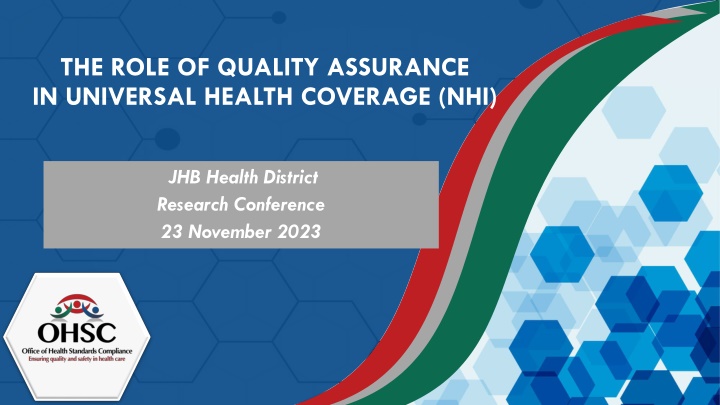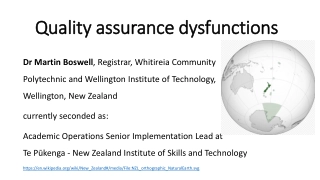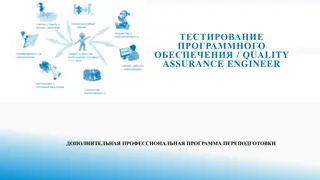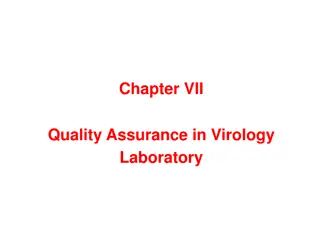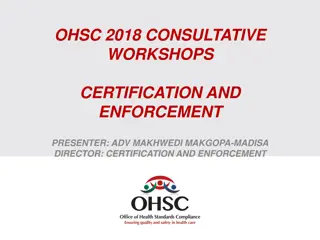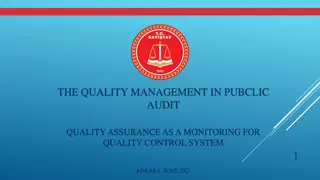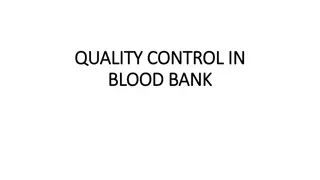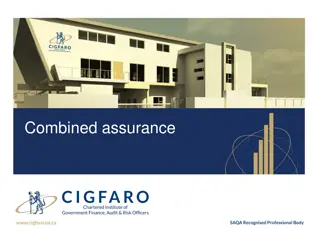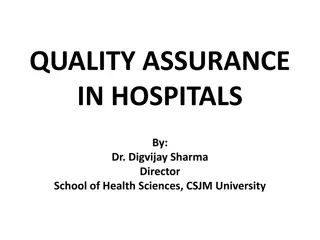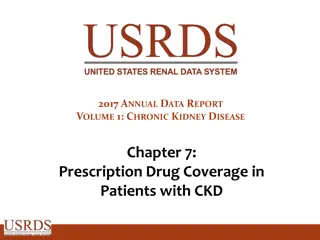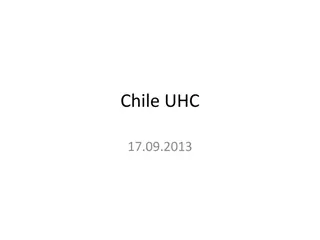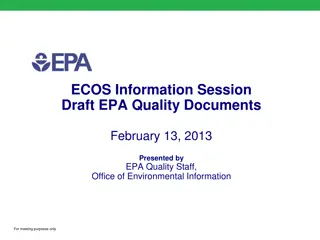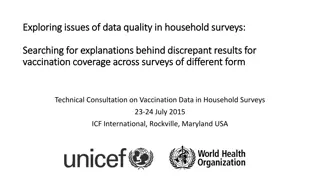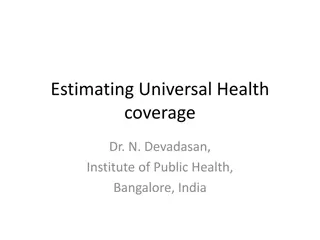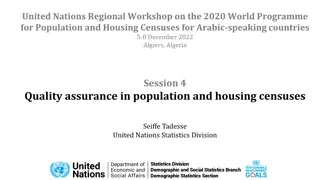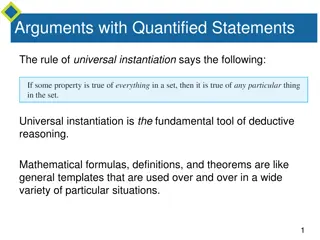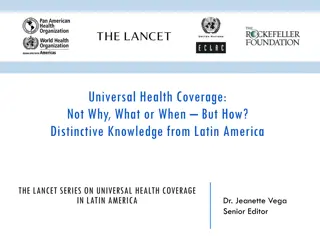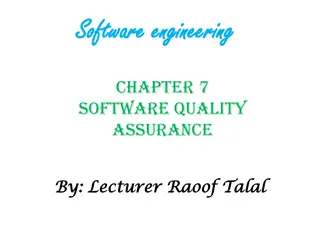Quality Assurance in Universal Health Coverage: Role of OHSC
Providing an overview of the Office of Health Standards Compliance's role in Universal Health Coverage, this presentation highlights the importance of quality care in achieving UHC. It delves into the background of UHC, emphasizing access to quality healthcare for all South Africans through the National Health Insurance. The mandate of the OHSC as an independent entity is discussed, focusing on its legislative and policy framework. The presentation underscores the significance of monitoring and evaluating healthcare services to enhance UHC outcomes.
Download Presentation

Please find below an Image/Link to download the presentation.
The content on the website is provided AS IS for your information and personal use only. It may not be sold, licensed, or shared on other websites without obtaining consent from the author.If you encounter any issues during the download, it is possible that the publisher has removed the file from their server.
You are allowed to download the files provided on this website for personal or commercial use, subject to the condition that they are used lawfully. All files are the property of their respective owners.
The content on the website is provided AS IS for your information and personal use only. It may not be sold, licensed, or shared on other websites without obtaining consent from the author.
E N D
Presentation Transcript
THE ROLE OF QUALITY ASSURANCE IN UNIVERSAL HEALTH COVERAGE (NHI) JHB Health District Research Conference 23 November 2023
OUTLINE 1. Purpose 2. Background 3. Mandate of the OHSC 4. Functions of the OHSC 5. Powers of the OHSC and Implications 6. Desired Regulatory Outcomes / Impact 7. OHSC and NHI Link 2
PURPOSE Provide an overview of the role of the Office of Health Standards Compliance (OHSC) in Universal Health Coverage (NHI) 3
BACKGROUND The World Health Organisation (WHO) and the United Nations call it Universal Health Coverage (UHC) because nobody is left behind. UHC is a set of objectives that health systems pursue, and it is not a scheme or a particular set of arrangements in the health system. To address previous historical inequities and to ensure universal coverage for all South Africans: The government decided on National Health Insurance (NHI) as the means to transform the health system and grant all citizens access to good quality health services irrespective of their socio-economic status. It is designed to pool funds to provide access to quality affordable personal health services for all South Africans. 4 * National Department of Health_ Key messages on National Health Insurance
BACKGROUND Critical to the achievement of UHC, is quality of care. There is growing evidence on the relationship between quality of care and UHC. Especially related to the governance and efficiency of healthcare services and systems. UHC has gained renewed attention from researchers and policymakers following its inclusion in the 2030 Agenda for Sustainable Development (SDGs). However, several knowledge gaps remain, particularly related to monitoring and evaluation, including of equity. Further research, evaluation and monitoring frameworks are required to strengthen the existing evidence base to improve UHC. 5 *Yanful et al. Quality of care in the context of universal health coverage: a scoping review. BMJ - Health Research Policy and Systems (2023) 21:21
MANDATE OF THE OHSC Legislative and Policy Mandate National Health Amendment Act (Act No.12 of 2013) establishes the OHSC as an independent entity National Health Insurance Bill, 2019 (NHI Bill) Regulated Norms & Standards Procedural Regulations Pertaining to Functioning of the Office of Health Standards Compliance and Handling of Complaints by the Ombud 6
MANDATE OF THE OHSC To protect and promote the health and safety of users of health services by: Protect - implies the State s responsibility is to protect citizens from harm. Monitoring and enforcing compliance by health establishments with norms and standards prescribed by the Minister of Health in relation to the national health system; and Promote - implies the state plays an active' role in quality and safety of health services. Ensuring consideration, investigation, and disposal of complaints relating to non-compliance with prescribed norms and standards in a procedurally fair, economical, and expeditious manner. 7
VISION & MISSION Vision: Consistent, safe, and quality healthcare for all Mission: We monitor and enforce healthcare safety and quality standards in health establishments independently, impartially, fairly, and fearlessly on behalf of healthcare users 8
VALUES & PRINCIPLES We have respect for human individuality and treat each individual as a unique human being Human Dignity We take responsibility for our results and outcomes Accountability The OHSC s corporate values are shaped by ethical considerations and constitute guiding principles that govern the actions of all employees. OHSC staff members are required to always maintain the highest standards of integrity and our values listed below ensure there is no doubt of what is required of them. We operate in a way that creates openness between managers and employees Transparency Quality healthcare means doing the right thing, at the right time, in the right way, for the right person and having the best possible results Quality Healthcare We maintain a safe and healthy workplace for all employees in compliance with all applicable laws and regulations and promote a positive attitude towards safety Safety We conduct ourselves with openness, honesty, and respect for all stakeholders. Integrity 9
THE FUNCTIONS OF THE OHSC 1. Advice the Minister of Health on determining norms and standards to be prescribed for the National Health System and review of such norms and standards NATIONAL HEALTH ACT, NO 12 OF 2013 2. Inspect and certify health establishments as compliant or non-compliant with prescribed norms and standards or, where appropriate, withdraw such certification 3. Make recommendations for intervention by national, provincial or municipal health departments or by individual health establishments to ensure compliance with prescribed norms and standards MUST Section 79 of the National Health, Act No. 12 of 2013 4. Publish information relating to prescribed norms and standards through the media, website and Gazette, where appropriate, to specific communities 5. Recommend to the Minister quality assurance and management system for the national health systems 10
THE FUNCTIONS OF THE OHSC 1. Issue guidelines to help health establishments implement the prescribed norms and standards NATIONAL HEALTH ACT, NO 12 OF 2013 2. Request or collect any information on prescribed norms and standards from health establishments and health service user 3. Liaise with and exchange information with other regulatory authorities on matters of common interest and specific complaints or investigations MAY Section 79 of the National Health, Act No. 12 of 2013 4. Negotiate co-operative agreements with any regulatory authority to co-ordinate and harmonize their work where their jurisdictions are closely related 11
POWERS OF THE OHSC AND IMPLICATIONS Assess; diagnose Recommend Advise Enforce Issue notice of non- compliance with norms & standards; monitor [Health establishments must implement corrective action] Implement sanctions for persistent non- compliance with norms & standards [May receive written warning, be subject to a hearing] Certify compliance with norms & standards (link to NHI) Monitor compliance; Early Warning Indicators of breach of norms & standards [Annual Returns, EWS, Complaints] Investigate complaints relating to breaches of norms & standards [Complaints Call Centre assesses calls, allocated for management or referred for investigation] Inspect to assess compliance with norms & standards [Routine and risk-based inspections] Advise on prescribed norms and standards for the health system [Publications / guidance outlining requirements] Issue guidance relating to norms & standards [Guidance outlining best practice] Recommend interventions and systems [Issue recommendations and publish response & outcomes] 12
POWERS OF THE OHSC AND IMPLICATIONS Promote and recognise Systems to assess and control risks to safety and quality User focus compassionate, respectful, available Provider focus effective, efficient Proactive, problem solving Accountable WHAT CHANGE IN BEHAVIOUR DO WE SEEK? Discourage and penalise Ad hoc and arbitrary actions / activities Impunity for abuse of power, negligence, non delivery Acceptance of mediocrity Its not my fault 13
DESIRED REGULATORY OUTCOMES/ IMPACT The mandate of the OHSC contributes to two distinct but interdependent regulatory outcomes Improvements in the availability, responsiveness and acceptability of health services for users Reductions in avoidable mortality, morbidity and harm within HEs through reliable and safe health services In addition, it will contribute to enhancing universal access to quality services 14
KEY OHSC TECHNICAL PROGRAMMES 15
Organizational Structure Compliance Inspectorate Health Standards Development, Analysis and Support Chief Operations Officer (COO) Internal Audit Office Manager Complaints Management Board Health Ombud Corporate Services CEO Minister Chief Financial Officer (CFO) Personal Assistant Strategy, Planning, Monitoring & Evaluation Board Secretary, Governance, Compliance & Ethics Certification, Enforcement and Legal Services 16
Key Technical Programmes Development of Norms & Standards Regulations by the National Department of Health in consultation with OHSC Norms & Standards Regulations Health Standards Design, Analysis & Support (HSDAS) Inspection Tools Development Conduct Inspections Compliance Inspectorate Compliance Decision Certification, Enforcement & Legal Services Certification, Enforcement & Legal Services 17
1. HEALTH STANDARDS DEVELOPMENT, ANALYSIS & SUPPORT 18
1. HEALTH STANDARDS DEVELOPMENT, ANALYSIS & SUPPORT To provide high-level technical analytical support to the functions of the Office through research and health system analysis. Development of data collection tools. Provide training in the use of the tools. In-depth analysis and interpretation of data collected. Establishment of stakeholder networks for capacity building and co- creation of information management systems. 19
2. COMPLIANCE INSPECTORATE 20
COMPLIANCE INSPECTORATE OHSC inspectors are qualified health professionals registered with professional bodies such as, the Allied Health Professions, Health Professions Council of South Africa, South African Nursing Council, or South African Pharmacy Council. OHSC INSPECTORS The OHSC Inspectors, Complaints Assessors and Investigators capacitated through the Compliance Officer Training programme as required by the Procedural Regulations Pertaining to the Functioning of the OHSC and Handling of Complaints by the Ombud. 21
COMPLIANCE INSPECTORATE The OHSC Inspection Strategy developed annually, guides the approach to inspection of Health Establishments. published on the OHSC website. INSPECTION STRATEGY The Inspection Strategy include the following: 1. An approach to prioritising, scheduling and conducting inspections 2. Resources for the implementation of the inspection strategy 22
TYPES OF INSPECTIONS COMPLIANCE INSPECTORATE ROUTINE INSPECTIONS Every health establishment is to be inspected according to the National Health Act 61 of 2003 as amended once in four (4) years RISK BASED INSPECTIONS Targeted for persistent or critical noncompliance triggered by an Early Warning System and Ombudsman findings as per procedural regulations (5)(2)(b). ADDITIONAL INSPECTIONS They are inspections conducted to monitor whether breaches identified during the routine inspections have been remedied. In terms of the Regulations, an inspector may, at any time, subject to section 82 (1) of the Act, conduct an additional inspection if he or she has reasonable grounds to believe that; o Such an inspection in needed to establish whether non- compliance has been remedied within the Health Establishment o The Health Establishment is contravening the Act or any relevant regulations o There are serious breaches of norms and standards, based on the indicators of risk; or o The ombudsman findings demonstrate that continued exposure to the healthcare services provided by health establishment may pose a severe risk to users or healthcare personnel. 23
COMPLIANCE INSPECTORATE (1) (3) (2) The health establishment must make available the necessary staff, resources and space to allow inspectors to complete the inspection in a timely and expeditious manner. An inspector may question any user, occupant, healthcare personnel or any person on the premises of a health establishment about any information that is relevant to the inspection or require the person in charge to produce any document, record or material for inspection. The responsibilities of the health establishment during an inspection INSPECTION PROCESS (4) The person in charge may provide the inspector with any relevant information, documents, records, objects or materials for the inspector's consideration during the inspection visit. 24
COMPLIANCE INSPECTORATE Methodologies utilized for the collection of data during inspections in Public & Private Health Establishments : INSPECTION PROCESS .(cont.) Observations Documents review Patient Records Analysis Staff Interviews; and Collection of evidence (for both compliant and non- compliant measures) Estimated duration for inspections: Clinic one full day Community Health Centre- one full day Hospitals three (3) to five (5) days depending on the size of the health establishment 25
COMPLIANCE INSPECTORATE INSPECTION PROCESS .(cont.) 1. 2. 3. 4. 5. Post 6. 7. 8. Sending Notice of Inspections to HEs Conducting of the inspections Team validations Internal & External quality controls Issuing of reports Publishing of reports Distribution & Circulation of the inspection schedule inspection inter-team review 26
INSPECTED HEs Gauteng Province City of JHB Metro Inspected & Compliant Health Establishments (HEs) in City of JHB Metro Inspected & Compliant Health Establishments (HEs) in Gauteng 100 100% 90 90% 50 50% 45 45% 80 80% Number of HEs 40 40% 70 70% 35 35% Number of HEs 60 60% 30 30% 50 50% 25 25% 20 20% 40 40% 15 15% 30 30% 10 10% 20 20% 5 5% 10 10% 0 0% District Hospitals Regional Hospitals Clinics Clinics Clinics CHCs 0 0% District Hospitals Regional Hospitals FY19/20 FY20/21 FY21/22 FY21/22 FY21/22 FY21/22 Clinics Clinics Clinics CHCs Total 25 9 8 0 0 0 FY19/20 FY20/21 FY21/22 FY21/22 FY21/22 FY21/22 Non-Compliant 16 5 5 Total 87 42 31 2 0 3 Compliant 9 4 3 Non-Compliant 48 20 14 2 Compliance Rate 36% 44% 38% Compliant 39 22 17 2 1 Compliance Rate 45% 52% 55% 100% 33% 27
3. CERTIFICATION AND ENFORCEMENT 28
CERTIFICATION AND ENFORCEMENT The OHSC developed an Enforcement Policy outlining the approach to be followed in the exercise of its enforcement powers. OHSC ENFORCEMENT APPROACH The Enforcement Approach adopted by the Office is progressive in nature. 29
CERTIFICATION AND ENFORCEMENT CERTIFICATION OF HEALTH ESTABLISHMENTS RENEWAL OF CERTIFICATION OF COMPLIANCE REQUIREMENTS FOR APPLICATION FOR RENEWAL HEs compliant with the regulated norms and standards will be issued with Certificates of Compliance. Health establishments shall apply for renewal of the certificate of compliance six months before the expiry date; Regulation 19 (2) states the Following requirements: OHSC Form 5 of the Regulations; The Certificate of Compliance will be valid for a period of four (4) years and is subject to renewal. Certification/Compliance status for a health establishment which has applied for renewal may be extended for a period not more than one year to afford the Office an opportunity to schedule an inspection; Annual self assessments; and Most recent quality plans. A Compliance Notice issued against a certified HE suspends the compliance status until the conditions set out in the compliance notice are fulfilled. 30
OHSC AND THE LINK TO NATIONAL HEALTH INSURANCE FUNDING FOR UNIVERSAL HEALTH COVERAGE In relation to the OHSC: the NHI Bill (2019) provides that the process of accreditation of health care providers will require that health establishments are inspected and certified by the Office of Health Standards Compliance . This therefore outlines the crucial role to be played by the OHSC in relation to the implementation of NHI in the Country. The importance of the OHSC lies not only in its role under the NHI. OHSC also plays a role in the improvement of healthcare quality in South Africa as it relates to both private and public healthcare. 31
OHSC AND THE LINK TO NATIONAL HEALTH INSURANCE FUNDING FOR UNIVERSAL HEALTH COVERAGE MONITORING RISK SERVICES TO BE PROVIDED NHI FUND SERVICE PROVISION INSPECTIONS CONTRACTING CERTIFICATION ACCREDITATION COMPLIANCE WITH NORMS & STANDARDS COST/ PRICE Certification of compliance with regulated standards is a prerequisite for funding. 32
OHSC AND NHI LINK Thus . the OHSC will act as a gateway to the process of accreditation of healthcare providers to the National Health Insurance. 33
www.ohsc.org.za +27 (0)12 942 7700 34
